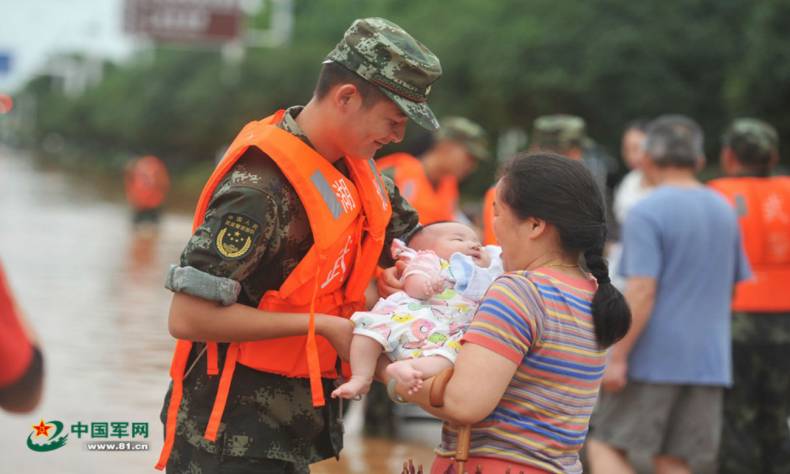
Xi Calls for Deepened Military-Civilian Integration
President Xi Jinping made this point very forcefully at a plenary meeting of the delegation of the People’s Liberation Army and Armed Police at the first session of the 13th National People’s Congress on March 12, 2018
By Hu Xin
“Implementing the strategy of military-civilian integration is a prerequisite for building integrated national strategies and strategic capabilities and for realizing the Party’s goal of building a strong military in the new era.” President Xi Jinping made this point very forcefully at a plenary meeting of the delegation of the People’s Liberation Army and Armed Police at the first session of the 13th National People’s Congress on March 12, 2018. His words have brought the strategy of military-civilian integration into public focus.
Military-Civilian Integration is an International Trend
Military-civilian integration plays a key role in the military development of the major powers, as well as in their economic innovation and development. Countries such as the US, Russia, and France have created effective national strategies based on the integration of national technological development, economic innovation, defense and military advances.
This integration has made progress possible not only in manufacturing defense technology and the combat-readiness of troops, but also in national economic development, industrial transition and upgrading, and increasing job opportunities.
That is to say, successful military-civilian integration can help a country to occupy the high ground in the international competition for military and general supremacy.
Military-civilian Integration is a National Strategy
During the Third Plenary Session of the Eleventh CPC Central Committee in 1978, the principle of converting military technology to civilian applications was formulated, which opened a pathway for further military-civilian integration.
“Military-civilian cooperation and integration” was launched in 2003. In 2013, the CPC put forward proposals for deeper military-civilian integration, including promoting the united leadership, civil-military coordination, demand docking, and resource sharing at national level.
Since the 18th National Congress of the CPC in 2012, military-civilian integration has proved a successful strategy as China pursues coordinated development in its national economy and defense.
The Orientation of Military-civilian Integration was Defined
During his visit to the second national exhibition on high-tech achievements resulting from military and civilian cooperation, which was held in Beijing on October 19, 2016, President Xi said: “Military-civilian cooperation, as a national strategy, is crucial to national security and the bigger picture of development. It helps to build a prosperous nation and stronger armed forces.”
With the rapid development of science and technology, there is a growing link between national strategic competitiveness, social productivity, and the combat effectiveness of the army. At the same time, the increased integration between the defense economy and the social economy, and between military technology and civilian technology, is clear to see. These call for a new policy and new orientation to upgrade technological innovation, so as to enhance China’s overall strength.
The Overall Framework was Set Up
In 2016, the Political Bureau of the CPC Central Committee passed Opinions on the Integration of Economic Construction and National Defense, creating the overall framework for military-civilian integration. The document, based on national security and overall development strategy, promotes economic construction and national defense as a whole. It sets the general objective, and defines the main tasks and measures for military-civilian integration going forward.
The Superstructure has been Strengthened
The Political Bureau of the CPC Central Committee decided to establish the Central Military-civilian Integration Development Committee in January 2017, and President Xi Jinping directed the first meeting of the committee in June. This was a milestone as it passed four important documents including Work Rules of the Central Military-civilian Integration Development Committee.
Xi chaired the first meeting of the Central Military-civilian Integration Development Committee, which passed important documents including Opinions on Deeper Military-civilian Integration in the Science and Technology Industry of National Defense. These documents emphasize the need for a structured approach to deeper military-civilian integration and an integrative national strategic system.
Seizing Development Opportunities
The first penalty meeting of the 19th Central Military-civilian Integration Development Committee passed the Outline of Military-civilian Development Strategy and Implementation Plan of National Military-civilian Integration Innovation Plot Zones, which reinforced the support for military-civilian integration development strategy, with a clearer blueprint, orientation, and basic requirements, as well as requiring more rapid development.
Starting later than many other countries, military-civilian integration in China has encountered many difficulties, as the system had to be built from scratch. The most urgent tasks are to clarify, extend, and refine the relevant policies.
Military-civilian integration made steady progress between the 19th CPC National Congress in October 2017 and the NPC and CPPCC annual sessions in March 2018.
Military-civilian integration will focus on fields of high commonality such as electronic information technology, exploration in the oceans and outer space, new energy development, and biotechnology. Meanwhile, the system will be boldly reformed.
China is in a period of strategic opportunities for national military-civilian integration development, and a crucial period for the transformation from elementary to deeper integration.
We need to make good use of this crucial period by following the guidance of the general national security and military strategies, strengthening superstructure, improving demand integration, balancing increments and stockpiles, and accelerating the creation of a clear structure for military-civilian development.
Hu Xin, Doctor of the School of International Relations at the National University of Defense Technology,specially-appointed Researcher of Strategy and National Security Institute at the Belt and Road Initiatives and Global Governess in Fudan University.
The feature picture shows that on August 14th, 2017, the Xianning detachment of the armed police force transferred the local residents when heavy rain hitted Xianning, Hubei.
 Facebook
Facebook
 Twitter
Twitter
 Linkedin
Linkedin
 Google +
Google +








